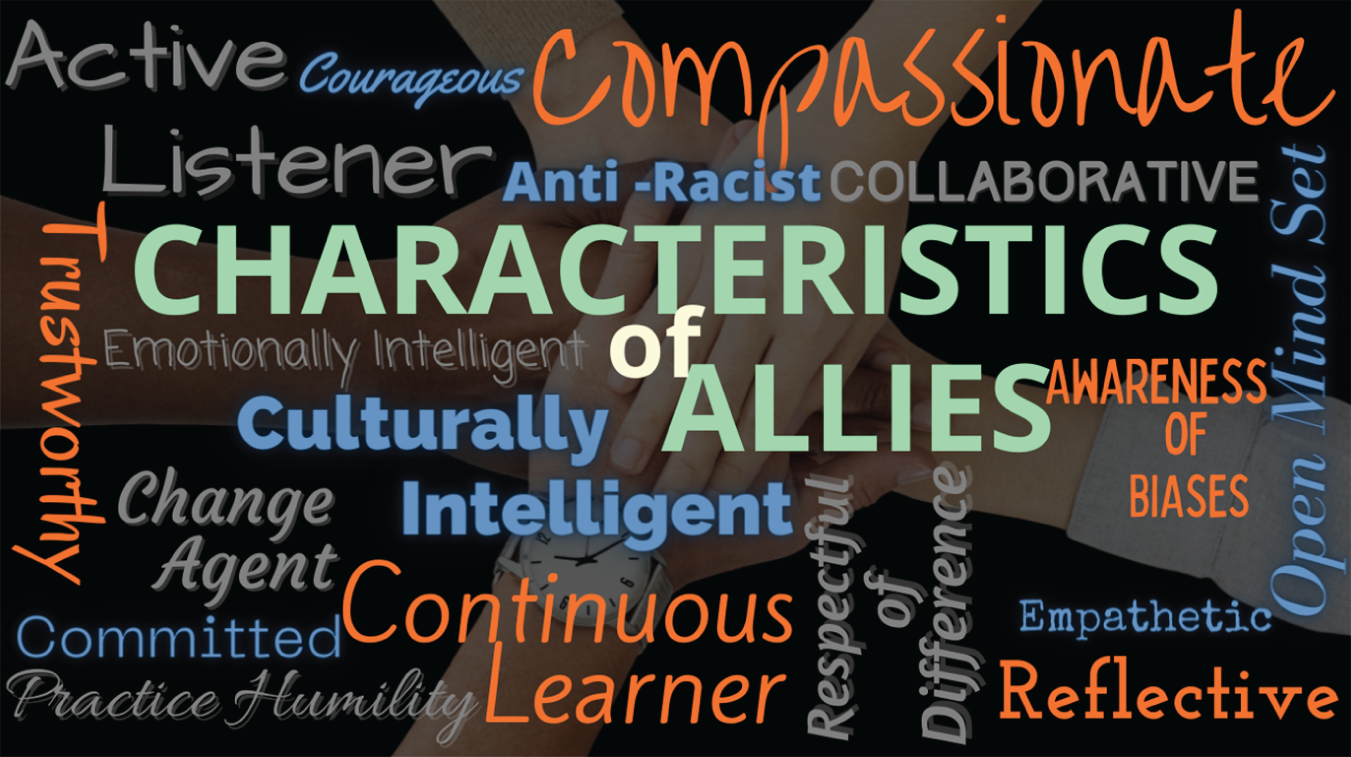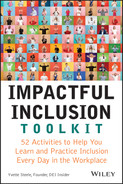ACTIVITY 13
Aspire to Be an Ally
“And if we are lucky enough to be in a position of power, if our voice and our actions can mobilize change, don't we have a special obligation? Being an ally can't just be about nodding when someone says something we agree with—important as that is. It must also be about action. It's our job to stand up for those who are not at the table when life-altering decisions are made. Not just those people who look like us. Not just those who need what we need. Not just those who have gained an audience with us. Our duty is to improve the human condition—in every way we can, for everyone who needs it.”
—Kamala Harris
***
Allies in the workplace are essential to inclusive cultures, creating positive experiences for others and advancing one's career. Getting ahead, being valued, or respected without gender, race, or other privileges can seem insurmountable. So, how do you know whether you are an ally? I've seen many explanations, and I find this one to be very thorough. Chikere Igbokwe, founder and diversity, equity, and inclusion consultant at Inclucive, defines an ally as “someone who uses their power and privilege to advocate for others. Allies are not members of marginalized groups. Allies support Black, Brown, and minority employees, colleagues, and friends by understanding what they go through. Allies educate themselves on issues that affect Black, Brown, and minority people, speaking out on injustices, educating colleagues, friends, and family about being an ally and acknowledging their privilege and being actively anti-racist.” Taking this a step further, anyone with some level of privilege can be an ally to others with less privilege. As a Black, able-bodied, cisgendered female, I am definitely in a marginalized group. My privilege comes from being able-bodied and never having to give a second thought to my identity. I educate myself on the issues facing individuals with disabilities and my LGBTQ+ friends and work to make a difference.
Everyone has at one time or another needed the support of an ally. Prisha was a mid-level finance manager who wanted to be on the strategic task force for a high-profile project. She had no relationship with the decision-makers, when someone made an introduction that positioned her to articulate her value and ultimately landed her on the team. Hakeem introduced an idea weeks ago that didn't get any traction only to be presented later by a peer who was applauded for it. When Hakeem spoke up to reclaim his idea, someone stepped in to back him. These acts of allyship made the difference between getting what was needed or desired and being left out in the cold with feelings of anger or frustration. Allies have the ability to bring about change for underrepresented groups by using their positions of power and privilege to interrupt the systemic and institutional dynamics that perpetuate inequities.
Allies are not self-proclaimed. We're an ally when the groups we support say that we are. We must build a demonstrated track record of impactful deeds. Being an ally requires courage as we actively engage with the work that drives change, which not only takes us out of our comfort zone but makes others uncomfortable as well. Let's face it, disrupting the status quo from which many have benefited can cause chaos and conflict. Understand that allyship is a journey of commitment for the long haul. The good news is that consistent acts of allyship change lives. As we create a groundswell of people living their best lives, the more we all benefit from the contributions they make.
The role of White men as allies can't be emphasized enough as they are the group with the most privilege and power. A post on Fortune.com reports that “white men account for 72 percent of corporate leadership at 16 of the Fortune 500 companies.” The White Men's Leadership study revealed that “Globally, 32 million white men hold leadership position with 6 million in the United States.” After decades of increased focus on diversity, equity, and inclusion, the ever-present underrepresentation of women and racial and ethnic minorities in leadership roles demands improved strategies. The Corporate Governance Research Initiative by Stanford Graduate School of Business shows only three Black people, five Hispanic people, and three people who identify as “other” in the Fortune 100 C-suite. Women account for only seven of those positions.
Begin your allyship journey today. Identify your privileges and take note of those around you with less privilege. In addition, take note of who has equal or greater privilege than you and join forces. Use your authority, power, and influence to dismantle barriers and empower others to thrive. It is okay to start small and work your way to bigger and better. Begin by educating yourself on the issues and take stock of your skills, competencies, and relationships that can be leveraged to increase effectiveness. Like any other worthwhile endeavor, allyship requires skill. The more we do it, the better we will become. Don't be discouraged by mistakes. Mistakes are part of the job. You can take the first step in any number of ways. Perhaps you can educate someone from a marginalized group on the politics of promotion within the organization, decline a coveted assignment and recommend a high potential person from an underrepresented group, or speak up when someone shares racist jokes. Champions of inclusion are active allies and keep an eye on the terrain for opportunities to bridge the gap between what is and what should be.
Actions
Educate Yourself on Allyship
Increase your understanding of what it means to be an ally and how allies can make a difference. Review the characteristics of allies in Figure 13.1. Consider two co-workers whom you believe could benefit from an ally. Observe how current dynamics are preventing them from thriving. Figure out ways you can impact those two individuals. Your efforts will impact not only them but others just like them. No need to announce it. Just do it.

Figure 13.1: Characteristics of allies
Become an Advocate for Organizational Change
Review your organization's employee handbook and look for opportunities where you can advocate for change. Are the biases of leaders creeping into organizational policies and practices? Identify one area where you could potentially make an impact and start a conversation with the appropriate people to open minds toward change.
Create a Network of Aspiring Allies
Spread the wealth. Introduce/connect people from varying privilege. Let them know why you think they should meet. Where people have commonalities are the best opportunities.
Support Others in Living Company Diversity Values
Note organizational diversity statements and commitments. Be mindful of how colleagues and leaders live these values. Support them in their inclusion journey. Practice “calling in” if needed. See the Inc.com activity accelerator in “Action Accelerators” to learn more about calling in.
Make an Ongoing Commitment
If your company has affinity groups in support of traditionally underrepresented groups, join one as an ally. Affinity groups meet regularly and welcome allies in support of their mission, goals, and values.
Action Accelerators
CamilleStyles.com: “How to Be an Ally—3 Questions to Turn Allyship into Action”:https://camillestyles.com/wellness/3-questions-to-turn-allyship-into-actionSHRM.org: “Workplace Allies Serve as Ambassadors for Change”:www.shrm.org/resourcesandtools/hr-topics/behavioral-competencies/global-and-cultural-effectiveness/pages/workplace-allies-serve-as-ambassadors-for-change.aspxJenniferBrownSpeaks.com: Good Guys: Beyond Intent to Impact with David Smith and Brad Johnson, Jennifer Brown:https://stitcher.com/show/the-will-to-change-uncovering-true-stories-of-diversity-and/episode/e143-good-guys-beyond-intent-to-impact-with-david-smith-and-brad-johnson-80516125YouTube.com: Screaming in the Silence: How to be an ally, not a savior, Graciela Mohamedi, TEDxBeaconStreet:www.youtube.com/watch?v=d2qAbp-t_FY&t=333sInc.com: “Calling in Vs. Calling Out: How to Talk About Inclusion,” by Maya Hu-Chan:www.inc.com/maya-hu-chan/calling-in-vs-calling-out-how-to-talk-about-inclusion.html
Sources Cited
- Alexandra Marinaki. “Allyship in the workplace: Be color brave, not color blind,”
Resources.workable.com,resources.workable.com/stories-and-insights/allyship-in-the-workplace - Stacy Jones. “White Men Account for 72% of Corporate Leadership at 16 of the Fortune 500 Companies,”
Fortune.com,fortune.com/2017/06/09/white-men-senior-executives-fortune-500-companies-diversity-data WhiteMensLeadershipStudy.com. Executive Summary, page 4,www.whitemensleadershipstudy.comGSB.stanford.edu. “Fortune 100 C-Suite Organizational Charts,” February 2020,www.gsb.stanford.edu/sites/gsb/files/fortune-100-c-suite-organizational-charts-feb-2020.pdf
